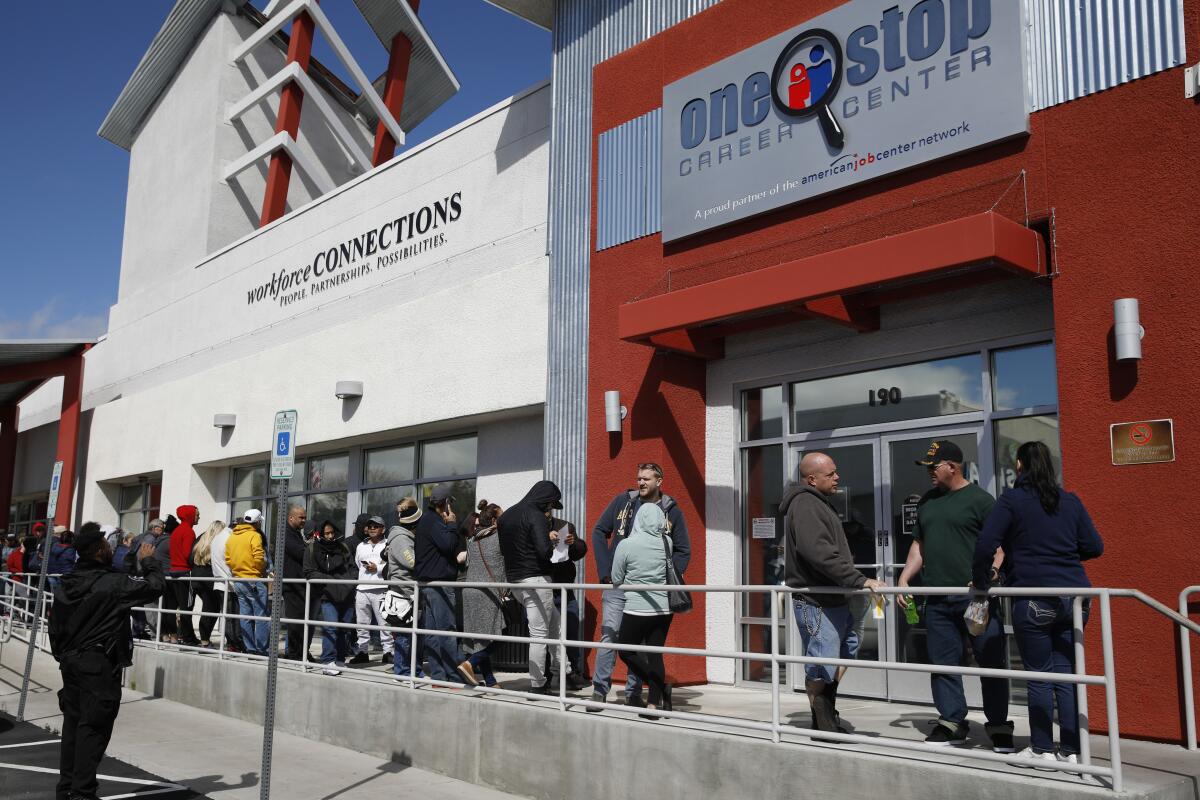What to do after coronavirus takes away your job

Dear Liz: I’m a single mom who just lost my job because of COVID-19. I have a mortgage, a car payment, credit card debt and a child who is headed to college in the fall. What do I do? I am very scared.
Answer: This is a very scary time. Your job now is to identify and use all the resources that may help you. You’ll need to be patient and persistent because millions of people are in the same boat.
Your first task could be among the hardest: applying for unemployment benefits. The Coronavirus Aid, Relief, and Economic Security Act, signed into law on March 27, expanded unemployment relief to include the self-employed (including contract and gig workers), people who work part time, and those whose hours were reduced because of the pandemic.
The act also adds $600 a week to the benefit amount that states offer, a supplement scheduled to last four months, and extends benefits for eligible workers until Dec. 31. In normal times, benefits end after 26 weeks.
The expanded benefits, plus an unprecedented number of job losses, have overwhelmed state unemployment offices. If possible, apply online with your state’s labor department rather than over the phone or in person. You’ll be sent important follow-up information; to avoid delays in starting your checks, carefully read that information and respond to any requests.
Unemployment benefits vary enormously by state. You may get enough to sustain you if you cut unnecessary expenses — or you may not. If you come up short, you have other options.
If your mortgage is federally backed — and most are — the CARES Act gives you a right to forbearance for up to 12 months. There’s also a moratorium on foreclosures and foreclosure-related evictions for these mortgages.
Forbearance means you don’t have to make payments, although interest will typically still accrue. Federally backed mortgages include loans owned by Fannie Mae, Freddie Mac and various federal agencies.
If you’re not sure whether your mortgage is federally backed, call your loan servicer — the company that takes your mortgage payments — and ask. Even if your loan is not federally backed, you may be eligible for some kind of relief. Explain your circumstances and ask what help is available.
Many other lenders, including credit card issuers, offer forbearance options as well. Some have information and application forms on their websites while others require you to call the customer service number to request help. Again, be prepared for long hold times.
You also can ask for more financial aid from your child’s college based on your changed circumstances. Check first to see if the financial aid office has an online form you can use or has outlined its preferred procedure for appealing a financial aid offer.
You may be tempted to put off asking for help, hoping that you will land another job before your household is on fumes. It would be more prudent, though, to assume you could be out of work for many months. Not only is unemployment skyrocketing, but a vaccine also could be a year or more away, indicating the economic disruptions likely will continue.
There’s one other part of the CARES Act that could help you: the “coronavirus hardship withdrawal.” The new law allows you to withdraw up to $100,000 from your 401(k) or IRA without penalty.
The withdrawal is taxed, but you can effectively spread the tax bill over three years. If you can repay the money within three years, you also can amend your tax returns and get a refund of those taxes.
Taking the money and not repaying it could have a devastating effect on your future retirement, but if you’ve run out of other options, a retirement plan withdrawal could help keep you afloat.
Push lenders for student loan help
Dear Liz: I saw your previous column about the federal student loan payments being suspended by the CARES Act until Sept. 30, with interest being waived. I reached out to my loan servicer about my loans and was told that while they are federal loans, they were made before 2010 and are not covered by the relief bill.
Answer: Your experience is an excellent example of why loan servicers have attracted so much criticism in recent years for misleading borrowers about their options.
You should have been told that although your Family Federal Education Loan (FFEL) program loans don’t qualify, you can consolidate your loans through the U.S. Department of Education’s direct loan program and the consolidation would qualify for relief. You can get more information at StudentAid.gov.
Liz Weston, Certified Financial Planner, is a personal finance columnist for NerdWallet. Questions may be sent to her at 3940 Laurel Canyon, No. 238, Studio City, CA 91604, or by using the “Contact” form at Ask Liz Weston.
More to Read
Inside the business of entertainment
The Wide Shot brings you news, analysis and insights on everything from streaming wars to production — and what it all means for the future.
You may occasionally receive promotional content from the Los Angeles Times.









